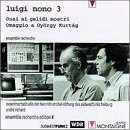| All Artists: Luigi Nono, Andre Richard Title: Luigi Nono 3: Guai ai Gelidi Mostri, for Flute, Clarinet, Tuba, 2 Contraltos, Viola, Cello, Double Bass & Live Electronics (1983) / Omaggio a György Kurtág, for Contralto, Flute, Clarinet, Tuba & Live Electronics (1983, 1986) - Ensemble Recherche Members Wishing: 3 Total Copies: 0 Label: Disques Montaigne Release Date: 6/6/1995 Genres: Pop, Classical Styles: Vocal Pop, Symphonies Number of Discs: 1 SwapaCD Credits: 1 UPC: 093046968021 |
Search - Luigi Nono, Andre Richard :: Luigi Nono 3: Guai ai Gelidi Mostri, for Flute, Clarinet, Tuba, 2 Contraltos, Viola, Cello, Double Bass & Live Electronics (1983) / Omaggio a György Kurtág, for Contralto, Flute, Clarinet, Tuba & Live Electronics (1983, 1986) - Ensemble Recherche
CD Details |
CD ReviewsSolemn electro-acoustic indictment of the capitalstate R. Hutchinson | a world ruled by fossil fuels and fossil minds | 06/10/2002 (5 out of 5 stars) "Luigi Nono was exceptional among the Darmstadt circle of the 1950s (which included Boulez, Stockhausen and Ligeti) in that he was politically engaged. Nono always emphasized vocal music, placing the voice of the people at the center of the drama, making history, with its tragedy and heroism. But Nono turned away from overt struggle in his "late period" from 1980 to his death in 1990, beginning with his string quartet. "Guai ai gelidi mostri" is from 1983, and it is a haunting low-volume electro-acoustic work with 3 strings, flute, clarinet and tuba, and 2 contraltos, along with real-time electronics. The "Omaggio a Gyorgy Kurtag" features vocals more prominently (though words are indistinguishable in both pieces), echoing Gregorian chant at times. It seems no coincidence that Nono's style changed, becoming less heroic, with the onset of the 1980s. This was a period of reaction, both globally (Reagan, Thatcher, Kohl) and in Italy especially, as the state ruthlessly crushed the extraparliamentary left that had been on the offensive throughout the 1970s. The capitalstate as a "cold monster" indeed! Nono's foreboding led to a great artistic breakthrough, even as the same developments provoked outrage in many of us, and led us into the streets. There is at present little in English on Nono. I would like to read more about how his politics intersected with his music. In his role as a leader of the PCI, I doubt that his perspective on the extraparliamentary movements was the same as mine, for instance. Regardless, Nono's music is some of the finest of the late 20th century, and should certainly be more widely known in the U.S.!" Immersive sound world from Nono which needs to be re-release dv_forever | Michigan, USA | 09/24/2007 (5 out of 5 stars) "By the 1980's Luigi Nono must have realized that political struggle wasn't really the way to get things done in this world, as far as an artist is concerned. This is a realization that everyone's favorite 19th Century German Superman Richard Wagner had after the revolutionary uprising he participated in during his early years failed. After that Wagner became acquainted and later obsessed with Schopenhauer's philosophy and ultimately became a greater artist than he ever could have been if he continued to be dominated by political involvement.
Art transcends politics, the greatest art transcends life and the world. Wagner realized that and perhaps on account of this recording, Nono was beginning to realize that. These pieces which skillfully mix electronic instruments with acoustic ones are very gloomy, solemn and contemplative. There is a mark of defeatism and possible death about them, much more so than earlier Nono and that was hardcore stuff! However, that's not to say this music is worthless, instead it's a new development in this artist's life. Perhaps by this time he understood internally that socialism as well as capitalism or any socio-economic political system was at odds with the more eternal aspects of the human condition. Art can tap into those eternal conditions more directly than politics or religion. If this recording is re-released, make sure to check it out. For the time being, find the more easily available Nono recording on Deutsche Grammophon if you want to take a dip into a typically overlooked 20th Century composer." |


 Track Listings (5) - Disc #1
Track Listings (5) - Disc #1